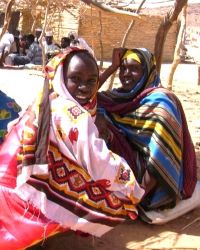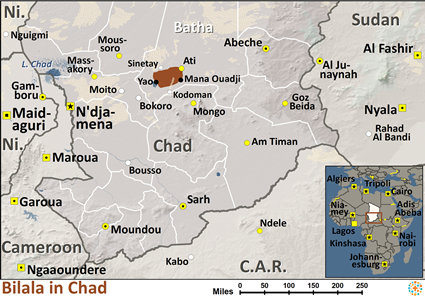The Bilala are a Muslim people who live in the central region in Chad. Along with the Kuka and Medogo peoples, the Bilala make up a larger group, the Lisi. The three groups speak mutually intelligible languages and often intermarry. The Bilala have lived near Lake Fitri (or Lake Chad) for over five hundred years. They were originally nomadic people who settled down to grow their crops and raise their livestock near the lake.
The Bilala speak a language called Naba. Audio Scripture recordings are available in Naba. Many Bilala also speak Arabic, which serves as a trade language in Chad. There are few, if any, known believers among the Bilala.
The primary occupation of the Bilala is agriculture, along with some animal husbandry. The Bilala grow crops such as millet, sorghum, cotton, and manioc (a tuberous, starchy root). Women usually have their plots of land near their homes. There, they cultivate vegetables for family consumption or sale. Wild rice, roots, locust beans, and wild fruits are also gathered from the forests near Lake Fitri.
Many Bilala have sheep, horses, camels, and a few cattle. Unlike most of their neighbors, the Bilala milk their animals and make butter. Women perform this task. The men do the hunting, herding and most of the fishing. The women do some fishing, help the men with the agricultural work, and gather forest products. In addition, the women perform all domestic duties such as preparing the meals, collecting the firewood and caring for the children. The entire region of central Chad has several local and regional markets. The men usually trade at the larger, regional markets in caravans, while the women engage in trade at the local markets near their villages.
The Bilala live in compact villages, each of which is run by a local chief. The chief and the village elders are to settle disputes between the villagers and deal with outsiders. The rural Bilala live in round huts that have mud-brick or mat walls and cone-shaped thatch roofs. In the larger towns, they also made the dwellings of mud-brick, but they have flat roofs made of beaten earth. The villages comprise several fenced-in, rectangular compounds. Each compound contains several huts belonging to an extended family.
Polygamy is common among the Bilala. According to Islamic law, a man may have up to four wives. The first wife has privileged status and is considered the "chief" among the others. Each additional wife has her hut where her children will live with her until they are old enough to live on their own.
A Biala girl will live in her mother's hut until she is ready to marry. However, a boy will move out of his mother's hut as soon as he is old enough to build his hut after he reaches puberty. Families arrange marriages with the consent of the young people.
As far as we know, the Bilal are all Muslims. The nearby Muslim Arab merchants have strongly influenced them, with whom they trade regularly. Although they observe many of their pre-Islamic practices, they also follow Muslim laws and traditions.
Islam is a religion of works based on five basic teachings or "pillars." Muslims must affirm that "there is no god but Allah, and Mohammed is his prophet." Islam also required them to pray five times a day, give alms to the poor, fast during the month of Ramadan, and try to make at least one pilgrimage to Mecca.
The life expectancy in Chad is only about 52 years, one of the lowest in the world. The country's literacy rate is also low. The Bilala need more educational opportunities and modern health care facilities. Christian teachers and medical workers might have opportunities to share the love of Jesus with them.
The Bilal are also in need of Christian resources in their own language. A majority of the Bilala have never yet heard a clear presentation of the gospel.
There is a great need for Christian radio broadcasts and evangelistic resources to reach the Bilala with the gospel.
Pray the hearts of the Bilala people would be stirred to hunger after God.
Pray that family-based movement to Christ will soon transform Bilala society, blessing them spiritually and economically.
Pray for the Lord to move in the hearts of believers to give up their own rights and sacrifice their lives to see the Bilala people blessed by the work of Jesus Christ, the only Savior.
Pray for Bilala decision makers to open their communities to Christ's ambassadors.
Scripture Prayers for the Bilala in Chad.
| Profile Source: Joshua Project |

























